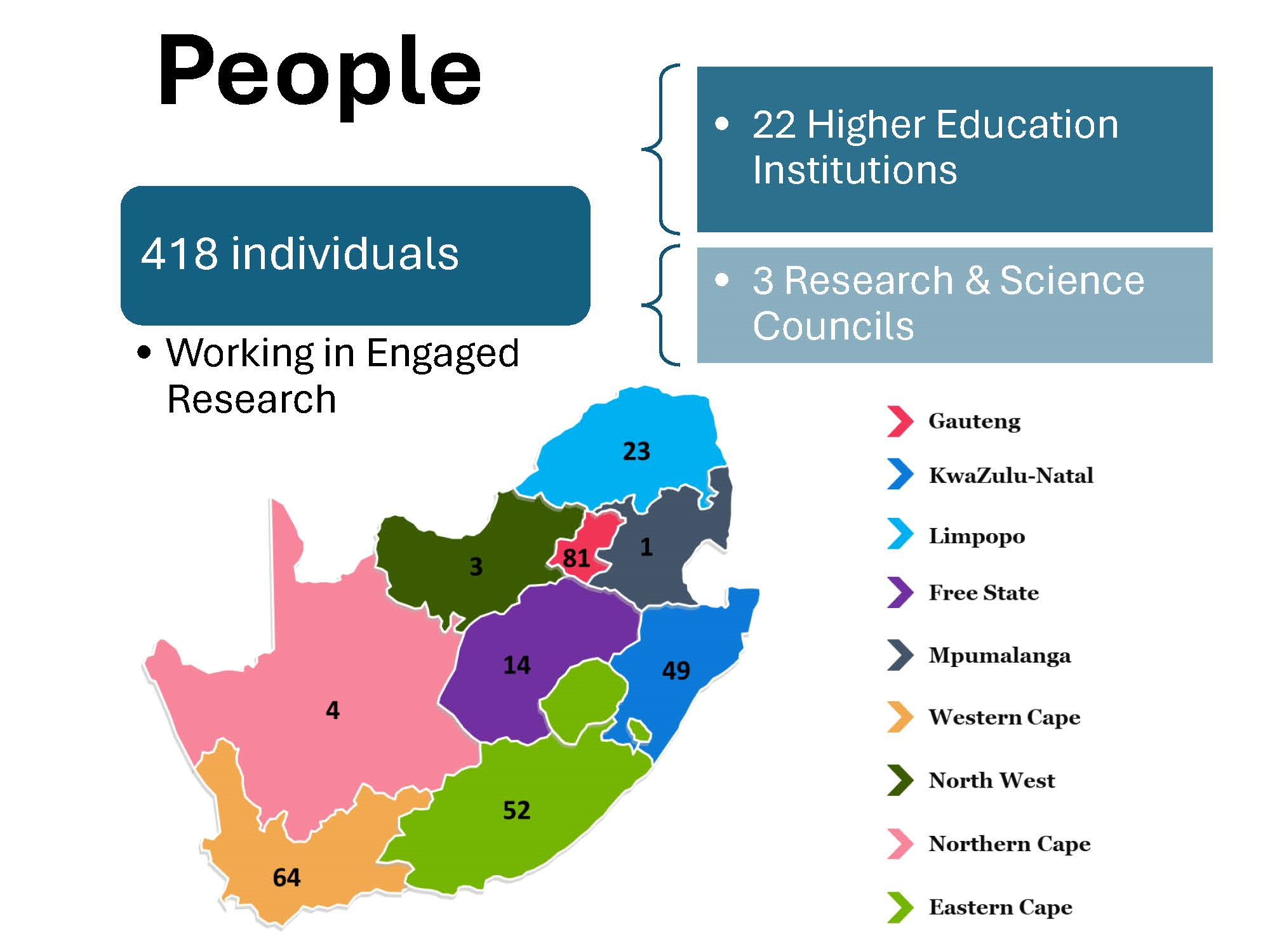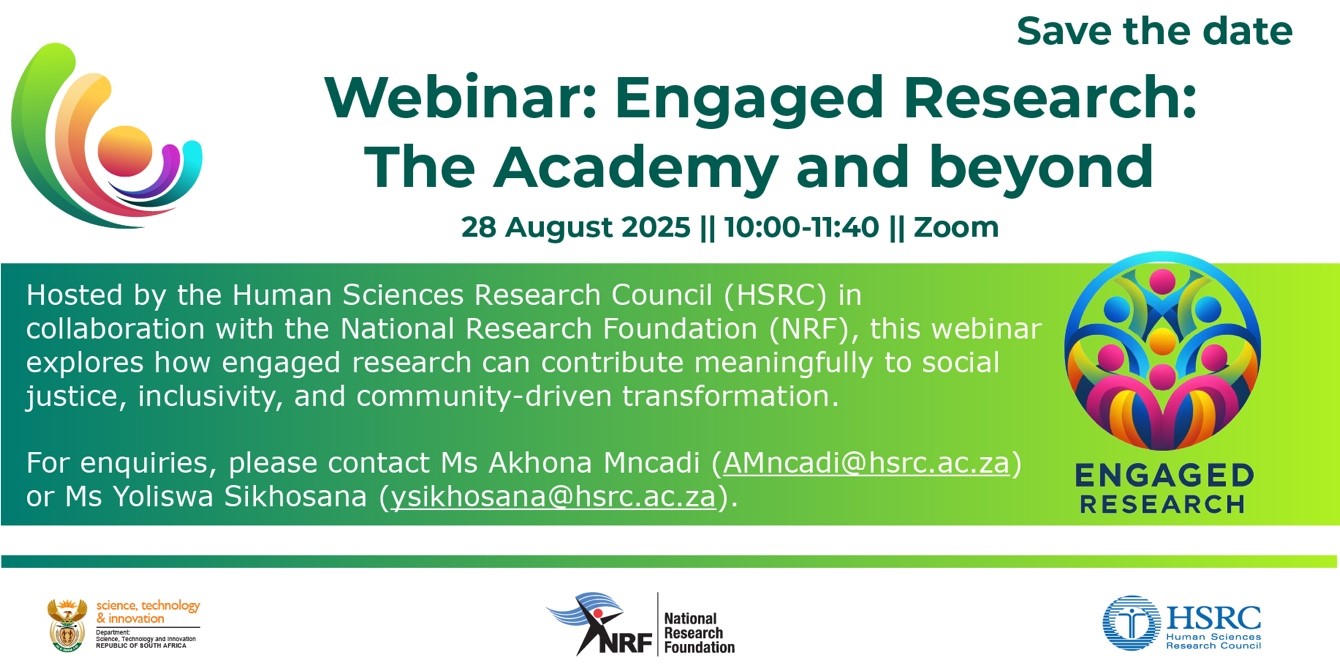We are inviting all our accepted speakers and poster presenters to please prepare their manuscripts in preparation for submission by 17 October 2025.
We would like to thank you once again for your valuable contribution to the Engaged Research Conference. We are pleased to invite you to submit a full paper based on your accepted abstract for consideration in Policy Design and Practice, a Taylor & Francis journal.
Please prepare your manuscript in line with the journal’s author guidelines and upload your paper through the HSRC submission portal.
We look forward to receiving your submission.
Kind regards,
Engaged Research Team
From evidence to influence: The policy dimensions of engaged research
By Yoliswa Sikhosana
The first blog in this series explored the power of working with communities to create research that matters. The second focused on people and partnerships as the foundation of engaged research. This next conversation looks at where that journey can lead; into the policy spaces where knowledge meets power, and where evidence can influence the decisions that shape our everyday lives.
At its core, the policy dimension of engaged research is about connection; the connection between what we learn through collaborative research and how that knowledge is translated into tangible change. Policy doesn’t emerge in a vacuum; it is shaped by the voices, relationships, and insights that feed into it. Engaged research offers a way to ensure that those voices include the communities and stakeholders who live the realities that policies seek to address.
When researchers work alongside policymakers from the outset, evidence can be co-produced with an understanding of political and social context. This shifts the dynamic from researchers presenting findings to decision-makers, to working with them to generate knowledge that responds to shared priorities. It’s a process that values dialogue over data-dumping, and influence through trust rather than authority.
Within the Engaged Research Project, this theme invites reflection on how such relationships are built and sustained. It recognises that influencing policy isn’t about lobbying or persuasion alone, it’s about cultivating spaces where evidence is credible, relevant, and grounded in the realities of people’s lives. The goal is not to claim ownership over outcomes, but to open up possibilities for policy that is informed by genuine engagement and co-creation.
Doing this work well takes time, patience, and institutional support. It requires rethinking how engagement is valued within research careers, how funding streams enable collaboration, and how evidence is communicated in accessible and inclusive ways. The ER project continues to explore these questions, acknowledging that the bridge between research and policy is still under construction, and that the process of building it is just as important as the outcomes it may produce.
Ultimately, the promise of policy-engaged research lies in its potential to make knowledge matter where it counts most: in decisions that affect people’s lives. By connecting evidence with policymaking in thoughtful and participatory ways, engaged research can help move us closer to a society where policies are not just informed by data, but shaped through dialogue, reciprocity, and shared understanding.
Impactful community partnerships
By Nonkululeko Dlamini
As part of our ongoing blog series, we are unpacking the Engaged Research Conference’s main themes. We move on to the second theme, Impactful Community Partnerships, and turn our attention to research that goes beyond collaboration to show what happens when partnerships are built on trust, reciprocity, and shared purpose.
Leading the way in community engaged research is the HSRC’s Centre for Community-Based Research (CCBR), which places collaboration and partnerships at the heart of its work. By ensuring that research is not only conducted in communities but also with communities, the CCBR has been able to deliver projects that are both impactful and sustainable.

A pioneer in implementation
On the research front, the CCBR has pioneered implementation studies such as Do PrEP, SMART ART, and BIYELA, these projects brought services closer to where people live, used trained community health workers, and designed care in ways that respect local culture and reduce stigma. By making healthcare more practical, local, and patient-friendly, CCBR has helped more people start and stay on treatment, while also generating evidence-based research to guide national health policies. These interventions have improved health outcomes while making services more accessible and acceptable to locals.
Collaboration and partnership are central to this effort. CCBR works directly with community members, providing training for local fieldworkers, supporting grassroots projects, and creating opportunities for employment and skills development. At the same time, it partners with government, non-governmental organisations, and health systems to ensure that research findings are translated into practice and policy. This creates mutual benefit where communities gain improved services, capacity, and empowerment, while researchers gain deeper insights and stronger evidence for scalable interventions.
Through its sustained presence and dedication to co-creation, the CCBR has demonstrated how partnerships based on mutual respect, trust, and shared goals can transform both science and society. Its work continues to set an example for how engaged research can bridge scientific knowledge and lived experience, building stronger and healthier communities.
Co-creation and participatory research approaches: Designing research with the community
By Thatohatsi Madumo
We’re kicking off a new blog series that unpacks the big ideas from the Engaged Research Conference. First up is Theme 1, which explores the power of working with communities and stakeholders to create research that truly matters.
Before we depart, let us take a look into what exactly is co-creation and participatory research. Participatory research and co-creation focus on the collaboration between academic researchers and non-academic stakeholders to adapt, or in certain instances, to even completely change the way we do traditional research (Greenhalgh et al., 2016; Blumenthal et al., 2013).
So, what role co-creation and participatory research have in engaged research?
When we talk about engaged research, one of the most important ingredients is participation. Research isn’t just about academics sitting in an office crunching numbers—it’s about people, communities, and the real-world impact that knowledge can have. This is where co-creation and participatory research step in.
Participatory research is built on relationships and trust. It means that the people most affected by a research topic are not just “subjects” of the study, but active voices in shaping it. When individuals and stakeholders are part of the process right from the beginning—and when they feel truly heard and seen—they tend to have much more positive experiences with the research (Benjamin et al., 2023).
And here’s the real beauty of it: co-creation doesn’t just make people feel included; it makes the outcomes stronger. By involving stakeholders in meaningful ways, researchers and communities together can design services, solutions, or interventions that actually work in practice. As Benz et al. (2024) highlight, this kind of collaboration leads to better and more satisfying results for everyone involved.
So, what does this mean for engaged research? Quite simply, it means moving beyond the “us versus them” divide. It’s about researchers walking alongside communities, building knowledge together, and ensuring that the work contributes meaningfully to the lives of those it touches. In the end, co-created research isn’t just more ethical—it’s more impactful.
Invitation to presenters to submit full papers
Engaged Research as a Pathway to Bridging Knowledge and Society
We are inviting all our accepted speakers and poster presenters to please prepare their manuscripts in preparation for submission by 17 October 2025.
We would like to thank you once again for your valuable contribution to the Engaged Research Conference. We are pleased to invite you to submit a full paper based on your accepted abstract for consideration in Policy Design and Practice, a Taylor & Francis journal.
Please prepare your manuscript in line with the journal’s author guidelines and upload your paper through the HSRC submission portal.
We look forward to receiving your submission.
Kind regards,
Engaged Research Team
Meet our keynote speakers
Engaged Research as a Pathway to Bridging Knowledge and Society

Dr Martina Jordaan
The practicalities of community-engaged research: what works (Keynote speaker, Day 2, Panel 1)
Dr Jordaan is the Head of Community-Based Research at the University of Pretoria (UP), Mamelodi campus. She holds a PhD in History from UP and a Master’s in Development Studies from the University of the Free State. Her research centres on community engagement and service learning, including a recent project with the Historical Society of Mamelodi to digitally preserve the township’s history.
She has experience at the Gauteng Department of Education in the Tshwane South District, supporting early childhood practitioners and school staff. Since 2004, she has coordinated the compulsory Community-Based Project Module for undergraduates in the Faculty of Engineering, Built Environment, and IT at UP and later served as Head of Community-Based Research at the Mamelodi campus.
Dr Jordaan is senior editor of the Journal for Applied Research in Higher Education, editor of HETL Frontiers magazine, and country director for the Higher Education and Teaching and Learning Association. She has published widely on community engagement and service learning and has been recognised with multiple awards at institutional, national, and international levels.

Prof Edmore Marinda
Measuring what matters: Evaluating the impact of engaged research (Keynote address, Day 3 morning)
Prof Marinda is Professor of Biostatistics and co-director of the South African Medical Research Council and the University of Johannesburg (UJ) Pan African Centre for Epidemic Research (PACER). The Centre conducts research on human epidemics with local and international partners and hosts 15 PhD candidates and one post-doctoral fellow.
With over 30 years of academic teaching and research experience, Prof Marinda’s work spans clinical trials, national health surveys, and evaluation of health programmes. Key projects include co-principal investigator of the South African National HIV sero-behavioural surveys (SABSSM V & VI), co-principal investigator of the South African National COVID-19 sero-prevalence survey, and senior biostatistician on the Zimbabwe Vitamin A for Mothers and Babies (ZVITAMBO) clinical trial. His expertise includes biostatistics, epidemiology, public health, health economics, policy, systems strengthening, and impact evaluation.
Before joining UJ, he served as acting Divisional Executive/Research Director at the Human Sciences Research Council’s Impact Centre, Research Evaluation & Monitoring Team Leader at Mott MacDonald, and senior biostatistician at the University of the Witwatersrand (Wits). He holds a PhD in Biostatistics from the Wits, an MSc in Medical Statistics from the University of Newcastle, Australia, and Master’s and Honours degrees from the University of Zimbabwe.

Chenai Chair
Engaged research in the age of technology (Keynote address, Day 2)
Ms Chair is Director of the Masakhane African Languages Hub. She is an internationally recognised research and policy specialist whose work bridges digital rights, AI ethics, and feminist approaches to technology.
She holds a Master of Social Science in Global Studies (University of Cape Town, 2014). Her expertise lies at the intersection of gender, technology, and social justice, with a focus on digital rights, data governance, and the ethical implications of AI through feminist and decolonial lenses.
Ms Chair’s contributions include leading the Masakhane African Languages Hub as a global leader in African language AI. She has led flagship initiatives at Research ICT Africa, the World Wide Web Foundation, and most recently Mozilla Foundation where she led the Africa Mradi – Mozilla’s strategic interventions of supporting innovation on the continent. She also led the East African Languages work under Mozilla Common Voice. She founded – My Data Rights (Africa) – a project that centers feminist perspectives in data governance and AI ethics. Through My Data Rights, she is leading efforts in network-building, knowledge curation, and collective action.
Chenai has authored numerous influential research papers, policy briefs, and thought leadership articles. Through her writing, speaking, and advocacy, she continues to shape inclusive, feminist approaches to AI and digital governance.
Launch of the Engaged Research Evidence Map incorporated into the conference
Co-hosted by the Human Sciences Research Council (HSRC) & the Pan-African Collective for Evidence (PACE)!
Join us for the official launch of the Engaged Research Evidence Map – a groundbreaking digital resource that brings together a wealth of research on engaged scholarship from across disciplines and low- and middle-income countries (LMICs).
This event forms part of the HSRC/NRF conference on Engaged Research to be held on the 21st-24th October, at the Birchwood Hotel. The evidence map has been co-developed as part of an HSRC/NRF project titled Mainstreaming ER in the NSI. The map, done in collaboration with the Pan African Collective for Evidence (PACE), is aimed at supporting knowledge sharing, informing policy, and strengthening engaged research practices across South Africa’s National System of Innovation.
What to Expect:
- Welcome and Project Overview
Learn about the goals, partnerships, and impact of the Engaged Research Project. - Understanding the Evidence Mapping Process
Explore the participatory and systematic approach used to co-create the map. - Live Demonstration
See how to navigate and use the evidence map to find research papers, spot trends, and identify gaps in the field of engaged research across LMICs. - Interactive Q&A
Engage directly with the development team and share your feedback.
Whether you are a researcher, policymaker, practitioner, or evidence enthusiast, this workshop will equip you with a powerful tool to support and grow your work in the field of engaged research.

Webinar on engaged research for social justice: The academy and beyond
27 August 202
Click here to register.
Link: https://zoom.us/meeting/register/uqqasEuERnq77E9An2lxrw#/registration

Feedback timeline for abstract submissions
Thank you for your submissions!
Thank you to all the scholars and practitioners who submitted abstracts for the Engaged Research Conference 2025. We’re encouraged by the enthusiastic response — with nearly 300 submissions received across a wide range of disciplines.
Due to the volume and quality of abstracts, our Scientific Committee is taking additional time to ensure each submission receives careful review and constructive feedback.
Feedback will be provided by 11 September 2025. We appreciate your patience and look forward to sharing a dynamic, inclusive conference programme that reflects the richness of engaged research in Africa.
Sponsorship opportunity: Attend the Engaged Research Conference 2025!
Are you an early career researcher passionate about making an impact through engaged and collaborative research?
The Engaged Research Conference (22-24 October 2025, Birchwood Hotel, Johannesburg) is offering a limited number of sponsorships to support exceptional emerging to mid-career scholars based at African institutions outside South Africa.
Connect with like-minded researchers, showcase your work and help shape the future of engaged research on the continent.
The sponsorship will be competitive, and it will cover:
- Visa costs (if applicable)
- Flights and accommodation
- Road travel in Johannesburg
- All meals during the conference
To be eligible, applicants must:
- Be based at an African university or organization (excluding South Africa)
- Be nearing completion of a PhD or have completed a PhD within the past 2 years
- Have submitted an abstract that has been accepted for presentation at the conference
- Commit to developing your presentation into a full article for submission to the special issue journal on engaged research
Applications will be assessed based on the quality and relevance of the submitted abstract, alignment with conference themes, and potential for contribution to the journal special issue. Applications close on 12 September 2025.

